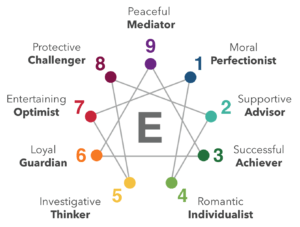Be Better: A Look Into the Enneagram

Do Good. Be Better. Have Fun.
In case you haven’t yet been enlightened by an onboarding talk with Jason Thompson, these are the values of Orange Consulting. It is the lens through which we look at every obstacle and opportunity in our business, but the hope is that it wouldn’t stop there. These are values that bring a big impact if carried over into other areas of life.
One way that we’ve been learning to “be better” in HQ lately has been diving into learning and understanding the Enneagram. The Enneagram is an ancient personality typing system which categorizes personality into nine interconnected types. Originating from the Greek words ennea (nine) and grammos (a written symbol), the Enneagram uses a nine-pointed symbol to depict the nine different personality types and how they interact and engage with one another. Each of the nine types has a different pattern of thinking, feeling and behaving determined by deeper key motivations, desires, and fears.
So what are these nine personality types? Let’s do a brief rundown.
Type 1: The Perfectionist
Ethical, dedicated and reliable, they are motivated by a desire to live the right way, improve the world, and avoid fault and blame.
Type 2: The Helper
Warm, caring and giving, they are motivated by a need to be loved and needed, and to avoid acknowledging their own needs.
Type 3: The Achiever
Success-oriented, image-conscious and wired for productivity, they are motivated by a need to be (or appear to be) successful and to avoid failure.
Type 4: The Romantic
Creative, sensitive and moody, they are motivated by a need to be understood, experience their oversized feelings and avoid being ordinary.
Type 5: The Investigator
Analytical, detached and private, they are motivated by a need to gain knowledge, conserve energy and avoid relying on others.
Type 6: The Loyalist
Committed, practical and witty, they are worst-case-scenario thinkers who are motivated by fear and the need for security.
Type 7: The Enthusiast
Fun, spontaneous and adventurous, they are motivated by a need to be happy, to plan stimulating experiences and to avoid pain.
Type 8: The Challenger
Commanding, intense and confrontational, they are motivated by a need to be strong and avoid feeling weak or vulnerable.
Type 9: The Peacemaker
Pleasant, laid back and accommodating, they are motivated by a need to keep the peace, merge with others and avoid conflict.
The beauty of the Enneagram in comparison to other personality typing systems (think Myers-Briggs, DISC or Strengthsfinder) is that it looks at the why rather than the what of personality. And you know we are all about the why here at Orange Consulting. Through finding your type, you can begin to better articulate who you are and why you say, do, feel, or think the way you do. It’s a humbling and helpful tool to see our very best potential juxtaposed with our greatest weaknesses. We can use the Enneagram as a GPS on the road to bettering ourselves and interacting with others in a more engaged, empathetic and understanding way.
In short, the Enneagram is a tool, and it should be treated as just that. It’s not gospel, but it is helpful in understanding not only ourselves but those that we interact with on a daily basis, whether in work or personal life. And as we grow into the strongest, healthiest versions of ourselves, we have the potential to not only be better but to have more impact in the lives of others and the world around us.
Interested in discovering your Enneagram type? You can take a free test online here.
Tune back into the Orange Perspective blog in the coming weeks as we further break down each personality type and how it can be used to better yourself not only as a professional but as a human.
Comments
I love thinking about this in terms of the team I work with. It is really helpful in understanding someone’s drive and how they work. I know the number you get isn’t the end all be all in terms of who you are but it is a really good starting point. My favorite part about these types of tests (enneagram, myers briggs, SOI) is how they open the door for discussion about how people work together. It often clears up confusion when you can moderately understand how a person is wired. Thanks for putting all this together Cassie!